Description
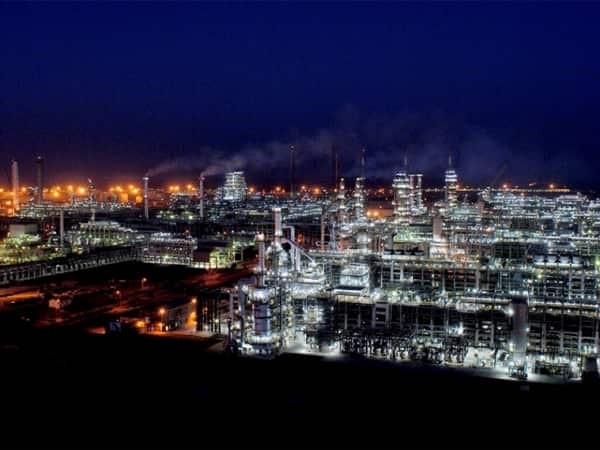
Disclaimer: Copyright infringement not intended.
Context
- In a little more than a year since the war in Ukraine began, deep discounts offered by Russia have made it the biggest source of crude for India.
Details
- For more than a year, India — the world’s third-largest consumer of crude with an import dependency of more than 85% — has been importing a lot of Russian oil.
- It began soon after the February 2022 invasion of Ukraine, after Russia started to offer deep discounts to willing buyers, as Western countries began shunning Russian oil.
- Before the war, Russia was a marginal player in India’s oil trade, which was dominated by West Asian suppliers like Iraq, Saudi Arabia, and the United Arab Emirates (UAE). In a little more than a year, the discounts ensured that Russia became the biggest source of crude for India.
Statistics
- Data from the Directorate General of Commercial Intelligence and Statistics (DGCI&S) show India’s oil imports from Russia have grown more than 10 times since April 2022.
- The growth has been steady especially since December 2022, after the G7 imposed a $60-per-barrel price cap on seaborne Russian crude early that month.
CHART 1: Growth in Russian oil imports
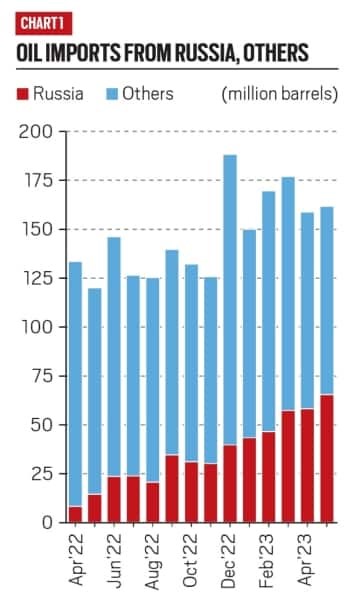
CHART 2: Russia gained, others lost out
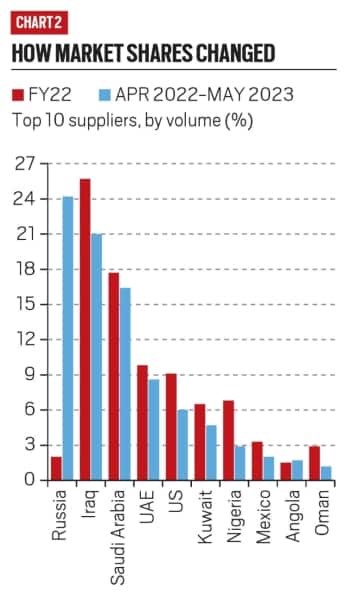
- A comparison between market shares (by volume) of India’s top 10 crude oil suppliers in the 14 months ended April 2023 and their shares in FY2021-22 shows how Russia has gained at the expense of other suppliers.
- Russia’s market share surged to 24.2% in the 14-month period, up from a measly 2% in FY22. Most of the other major suppliers saw their market shares fall. Iraq, Nigeria, and the US saw the most notable declines.
CHART 3: Russia rose high as OPEC fell
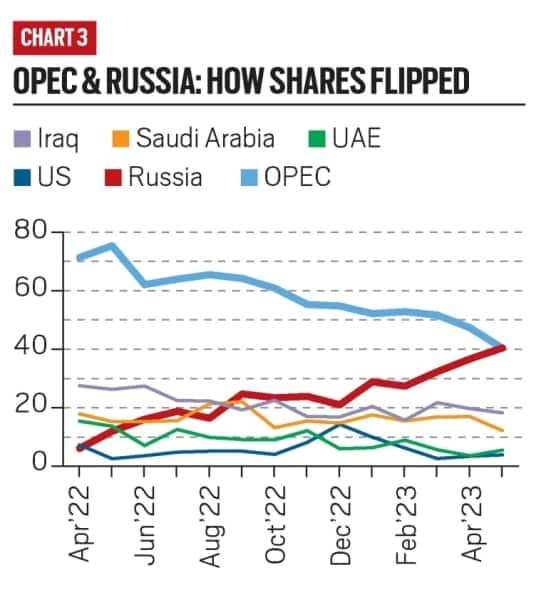
- The cumulative market share of members of the Organization of the Petroleum Exporting Countries (OPEC), the major oil producers’ group that dominated India’s oil import basket, declined dramatically as India’s Russian oil imports graph rose sharply.
- OPEC’s share in India’s oil imports fell by almost half — from 75.3% in May 2022 to 40.3% in May 2023. Among the major suppliers to India, Iraq, Saudi Arabia, the UAE, Kuwait, Nigeria, and Angola are members of the OPEC cartel.
- During the April 2022-May 2023 period, Russia’s share in India’s oil imports zoomed from 6% to 40.4% — and, according to various analysts and industry watchers, appear to have peaked.
Trivia
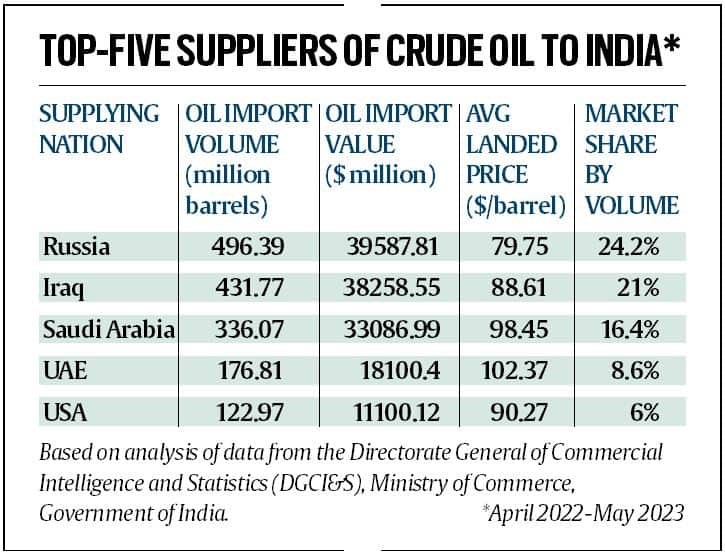
Western Media’s criticism of India for buying Russian Oil
- The Western media recently carried news items such as ‘India is snapping up cheap Russian oil’ and ‘India’s Russian oil buy: Red flag of red herring’ to censure India. Some in the media even called it an “opportunistic buy”.
India cannot be faulted for buying Russian oil: The Rationale
- It is only natural that when offered a lower price compared to others, India opted to buy Russian oil. From the Western perspective, India’s decision amounts to refusing to toe the line of the US and its NATO allies.
- From India’s standpoint, the objective is not to hurt its economy recovering from the deadly Covid pandemic.
- When it comes to meeting its energy needs, India does not have allies who are valued either in terms of the prices offered or in making petro-products available in a timely manner.
- In a world that has become more polarised economically since the pandemic, with the gap between the rich and the poor widening, soaring energy prices shouldn’t make the situation worse. While Russia’s military action is condemnable from a humanitarian perspective, India should not push its economy into a crisis by toeing the Western line.
- Also, the Western media turning a blind eye to the continuing US/EU imports of Russian uranium/gas.
- Additionally, India’s dependence on Russia for commodities such as oil and gas has historically been low compared with that of the NATO nations. In fact, despite the animosity, the EU’s dependence on Russian energy has been increasing in the last few years.
- Before the recent ban, even the US had been importing crude oil from Russia. Also, the US was importing about 16 per cent of its uranium requirements from Russia until last year, and it still continues despite a Bill being introduced in the Senate to stop the same.
- There is an economic logic to India’s decision to purchase Russian oil. Energy prices are critical for the country, given its inclusive growth aspirations.
- Emerging from the pandemic with limited room for fiscal/monetary profligacy, there wasn’t a better option for India than accept the oil deal when offered at a discount. To tackle the rising inflation, policymakers need to reduce energy import costs.
- If Europe wants to protect its economy with access to Russian gas, one cannot understand the rationale behind the Western media’s criticism of India’s negligible oil imports from Russia. The EU still imports around $1 billion worth of crude oil every day from Russia.
.jpg)
The way out
- With India being the second most populous country and among the top ten nations in terms of GDP, access to energy at affordable prices is essential to ensure inclusive growth. India must replenish its granaries without adding to food inflation, and energy costs hold the key.
- Having been kept away from Iranian oil for so long and Russian oil now, significantly affecting supplies in the process, it is time global leaders looked at reducing OPEC’s oligopolistic control over oil supplies by demanding, say, a 30 per cent discount on their supplies through a multilateral arrangement. This will not only make energy accessible but also affordable.
- The world must find a better way to punish the perpetrators of humanitarian crises. They must be made liable to pay for the costs involved in rebuilding the affected nations by mandating that the payment from trade be partially deposited into an escrow account to be managed by the United Nations.
- Further, a nuanced global tariff arrangement for imports from politically sensitive nations with a record of trans-border offences, support for terrorism and indirect support to inhuman activities such as child labour may be put in place.
- To promote global peace, a multilateral trade/tariff/payments arrangement would be better than using unilateral tools such as economic sanctions.
|
PRACTICE QUESTION
Q. The Western media recently carried news items such as ‘India is snapping up cheap Russian oil’ to censure India. What is the economic logic of India’s decision to purchase Russian oil? Also, it is time global leaders looked at reducing OPEC’s oligopolistic control over oil supplies to make energy accessible but also affordable. Justify.
|
https://indianexpress.com/article/explained/explained-economics/india-russia-oil-trade-transformation-seven-charts-https-indianexpress-com-article-business-india-iraq-oil-trade-public-sector-refiners-crde-oil-russian-oil-8853397/


















